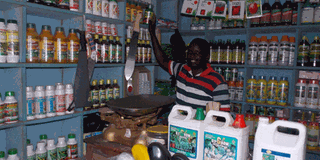Farm safety and handling of agrichemicals

Agricultural chemical dealers must explain to the farmers how to handle the chemicals. PHOTO/MICHEAL J SSALI
What you need to know:
- The battle against pests and diseases involves use of agricultural chemicals which has become a public health concern.
Since we live within the tropics the warm climate of the region is quite conducive to the eruption and multiplication of pests that are a major hindrance to crop production.
Pests and crop diseases are said to multiply much more rapidly in this part of the world than in cooler countries. The Ugandan farmer is therefore constantly fighting an extremely costly war against pests and crop diseases.
Pesticide poisoning
The battle inevitably involves the use of agricultural chemicals not only to kill the pests but also to destroy weeds. Yet the continued application of poisonous chemicals by the farmers has turned out to be a big public health problem that must be addressed immediately.
In his paper, titled “tackling pesticide exposure in Sub-Saharan Africa: a story from Uganda,” Aggrey Atuhaire, coordinator of the pesticide safety programme at Uganda National Association of Community and Occupational Health (UNACOH) has disclosed: “In 2005, UNEP estimated the costs of lost work, medical treatment, and hospitalisations due to pesticides poisonings among farm workers on small land holdings in 37 Sub-Saharan African countries to be $4.4b.”
For Uganda, the estimated total costs were $273.95m, that is, $25.51m being costs of serious incidents (hospitalisation plus lost work), $75.27m being costs of moderate incidents (medical treatment plus lost work) and $173.16m being costs of minor incidents (lost work).
Consumers exposed
The food consumers too are exposed to food that is contaminated with pesticides which poses a risk of short-term and long-time health issues. Studies carried out in 2018 by Pesticides Use, Health and Environment (PHE) Project revealed that tomatoes randomly picked from stalls and shops in Kampala, Sembabule, Wakiso, Kayunga, Rakai, Bushenyi, Ntungamo, Kamwenge, Masindi, Nebbi, Adjumani, Kitgum, Gulu, Kapchorwa, Kumi, Pallisa, Budaka and Bugiri, and taken to Government Analytical Laboratory Ministry of Internal Affairs, had high concentrations of Mancozeb, a fungicide commonly used by tomato farmers.
Safe usage
As we debate the need to expand our cancer wards and to allocate more funds to the health sector it is important that we pay attention to farmers’ education about food handling and safe usage of agricultural chemicals.
To be honest, it is hard to completely avoid the application of agricultural chemicals in farming. They no doubt enhance agricultural production, poverty alleviation, and food security but at the same time they pose a big public health and environmental risk.
Dr Deogratias K Sekimpi, executive director of UNACOH, has told Seeds of Gold, “There is a big need for the sensitisation of the farmers and all other food handlers such as traders about the danger of careless application of pesticides and other agricultural chemicals. We cannot of course completely do away with the chemicals in our farming systems but the farmers must be helped to understand that the chemicals are actually poisonous and that they must be very carefully used or else we could be increasing food production and at the same time creating bigger health problems,” says Sekimpi.
Even for harvested crops such as maize, beans, groundnuts, and others many farmers are not sure how to apply pesticides in prescribed rates to protect them against weevil attack. Sekimpi recommends the use by farmers of air tight bags to store their harvested and well dried grain.
In a phone conversation with Seeds of Gold last week Aggrey Atuhaire attributed the problem to general lack of sufficient information among the minimally educated small and medium-scale farmers in rural areas who primarily rely on pesticides, acaricides, and herbicides to produce food.
“In the industrialised countries where agricultural chemicals have been used much longer only a very small percentage of their populations are engaged in agriculture which is done on large-scale farms. In those countries the chemicals are applied by well trained and highly qualified personnel which makes their usage quite safe. However most of the traders dealing in agricultural chemicals in Uganda cannot even read and comprehend the literature that comes with the chemicals from the manufacturers and therefore are not in a position to explain to the poorly educated farmers how to use them,” says Atuhaire.
Washing vegetables
Consumers are advised to thoroughly wash the vegetables with warm water and in case of such crops as tomatoes even peel off the outer skin before eating or cooking them.
Consumers are further advised to grow their own food if they have any space where they can do so and to be cautious about the danger of mishandling agricultural chemicals.
He said that mindless usage of pesticides, acaricides and herbicides has also led to pollution of common water sources for both livestock and local communities. When it rains the water runs over ground where the agricultural chemicals have been applied on the crops and flows into the valleys carrying with it the poisons.
Tips
Misuse of chemicals by farmers
The study also revealed that only 12 per cent of the tomato farmers mixed the pesticides according to manufacturer’s guidelines.
Other chemicals found in the tomatoes were: Malathion, Metalaxyl, Profenos, Cypermethrin, Dichlorvos, Chlorpyrifos, and Lambda-cyhalothrin.
Misuse of agricultural chemicals by farmers is only getting worse and not reducing mainly due to lack of public sensitisation on pesticide and food safety. We are currently witnessing the reluctance by Kenya, to import our maize due to alleged contamination with aflatoxins linked to cancer and liver damage.
Yet as a country, according to some records, Uganda consumes 60 per cent of the maize she produces which implies that the food we produce could be the real cause of our health problems given that the same Ugandan farmers are mishandling agricultural chemicals.




